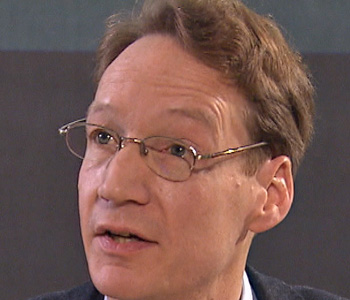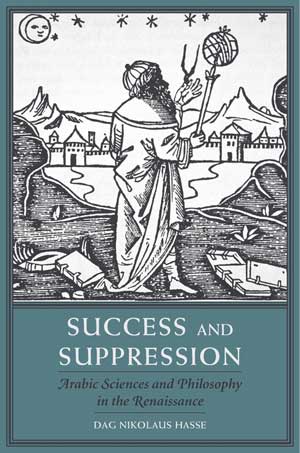
If you were asked to name some famous figures of Renaissance culture, you would probably name Leonardo, Michelangelo or Erasmus. But you could have mentioned some Arabic names too. There was an Arabic side to the European Renaissance, which is hardly known today. Arabic scientists and philosophers were mandatory reading at many Renaissance universities, especially in medicine, philosophy and astrology. On the book market of the time, Latin translations of Arabic scientific works were very successful. New, often multi-volume editions of these works steadily poured forth from presses in Venice, in Lyon, in Basle. The great names of Arabic science – Avicenna, Averroes, Mesue, Rhazes – were to be found everywhere on the academic bookshelves of Renaissance Europe. Every educated person knew these names.
This is the success side of the story. But there is also a suppression side to it. There was open opposition to Arabic traditions in Western culture, especially from humanists and church officials. Radical humanist scholars, in their enthusiasm for a return to the Greek and Latin sources, polemicized against Arabic science and demanded that university curricula be purged of Arabic authorities. As a result, these authors disappeared from many university curricula of medicine in the early sixteenth century – only to return, at least partially, at the end of the century.
In philosophy, the Arabic writer Averroes gave rise to a deep division among Renaissance intellectuals. He had dedicated partisans and bitter enemies. Many university professors believed Averroes to be the new Aristotle, but humanists protested against his lack of Greek; church officials against his alleged denial of personal immortality. In 1489 and 1513, the Bishop of Padua and the Lateran Council issued condemnations of select theses by Averroes. The effect can be traced in the intellectual biographies of some of Averroes’ partisans. But Averroes continued to be read and admired until the end of the sixteenth century.
The attempts to suppress Arabic traditions left clear traces in Renaissance scientific culture. Medicine, philosophy and astrology, the three areas of Renaissance learning most clearly influenced by Arabic sources, were greatly transformed by the polemical impact, with considerable gains and losses. The Arabic traditions lost their dominating position in many areas and subareas, in spite of the great success of some Arabic theories that we can still observe in the Renaissance. In this sense, the Renaissance is the period in which the West began to forget its debt to Arabic culture.
My book is about this double story of success and suppression.
There are many forgotten heritages in Western history, but the issue of Arabic influence is particularly contested because the heritage has its roots in a culture that suffers from Western prejudices today. A sensitive topic such as this calls for a sober historical approach. Yet, in recent years, the Arabic influence in Europe has been the subject of a number of biased studies, which minimize or maximize the influence in a way that distorts history.
There is the temptation to cherish a narrow and comfortably simple ideal of European high culture as formed by Greek, Roman, and Christian traditions, and at the same time to marginalize the contributions of other traditions to that culture — for example, pagan, oriental, Jewish, or Islamic — which make the history of the West much more complicated. In the eyes of those who cultivate this narrow ideal, scholarship today exaggerates the intellectual achievements of medieval Islam and the Arabic influence in Europe for reasons of political correctness. On the other hand there is the more forgivable temptation to overemphasize the blending of cultures and to celebrate Arabic influences, which upon closer inspection, turn out to be very thin.
My work is sustained by the conviction that the reaction to ideological accounts of the past can come only from the careful historical and philological scrutiny of sources, and from scholarship that does not shy away from judgments based upon such scrutiny.
At the traditional German Gymnasium in Kiel, where I was educated, Anton Raphael Mengs’ eighteenth-century copy of Raphael’s School of Athens adorned a wall of the auditorium, reminding everybody of the true torchbearers of culture. Later, as a student of Arabic, I realized that my Renaissance heroes of Greek and Latin culture were, on many occasions, bitterly opposed to my new heroes, the great Arabic philosophers and scientists. Was it possible that humanism had deteriorated into ideology and blinded humanists to the intellectual quality of Arabic science? Or was it that, by 1500, the tradition of Arabic science had outlived its historical role and that its supporters were men of the past whose obsolete theories deserved to be set aside? Without a satisfying answer, with sympathies for both sides, and with increasing awareness of the political implications, I studied the phenomenon with the aim of arriving at impartial and historically grounded answers. Nevertheless, the issue never lost its provocative sting for me.
It is a consoling thought – and perhaps a historical lesson – that ideology, the enemy of true knowledge, grows out of a very humane and productive property: partiality, the incessant motor of cultural change. In this respect, Georg Christoph Lichtenberg is right: “All impartiality is artificial. Man is always partial and is quite right to be.” It seems to me that the Renaissance epoch offers a rich array of the various gradations of partiality, and of the many gains and losses that such partiality entails.
One chapter of the book, for which I have a particular liking, bears the title “Humanists on Laxatives.” It tells the story of the reception of Arabic pharmacology in the Renaissance by focusing on a specific drug: the laxative senna. It leads the reader from the Arabic sources to the famous Renaissance botanists and from there to the eighteenth century. For some humanists, pharmacology was a textual science that needed to be purged of all Arabic accretions – which these authors achieved by way of deceptive textual manipulations. Other humanists were more empirical: they planted and tested senna themselves, comparing it with other laxatives. In the course of the sixteenth century, most pharmacologists realized that their Arabic predecessors in fact wrote very useful things.
However, I know from personal experience that not everybody is as enthusiastic about the history of laxatives as I am. Other parts of the book may have more appeal to those readers. Those with a taste for exquisite polemics might like the chapter on how the humanist Juan Luis Vives demonstrated what he believed to be Averroes’s ignorance. Vives analyzes a passage from Averroes’s Aristotle commentaries, debunking the Arabic commentator in grand fashion. In spite of all the rhetoric, Vives was right on much of the philological detail: The quality of Averroes’ exposition indeed suffered severely from the accumulated errors of transmission and translation. But Averroes was able to balance some of these defects with his enormous knowledge of the Aristotelian corpus. This is the secret behind his continuing success as a commentator on Aristotle in the Renaissance.
Some readers may feel deterred from reading a whole chapter about astrology, a discipline that most of us today, including myself, do not believe to be a serious science. But many Renaissance intellectuals did, and immersing oneself into the technical structure of famous astrological doctrines can be a real intellectual pleasure. For example, when important thinkers of the time, such as Girolamo Cardano and Johannes Schöner, compare competing Greek and Arabic astrological doctrines, with great acumen.
Personally, my favorite protagonists are those Renaissance scholars who take impressive intellectual turns in the midst of the heated controversies about Arabic sciences — such as Jacob Mantino, whose elegant and precise Hebrew-Latin translations successfully adopt Arabic scientific traditions to the expectations of humanist readers; or Giovanni Manardo, a hard-nosed humanist physician, who does not find fault with commenting on Arabic pharmacological sources; or Agostino Nifo, the Averroist philosopher who suffers from the pressure of orthodoxy, but finds a way out by molding himself into a champion of Averroes’s interpretation, without adopting any contentious doctrine himself.
The hostility of the humanist movement to Arabic sciences was far from monolithic. There are many examples of humanist scholars who contributed to the flourishing of Arabic sciences and philosophy in the Renaissance. Moreover, humanists did not explicitly oppose Arabic sciences because they were Oriental or because they originated from Islamic culture. Rather, they opposed them partly for scientific reasons, partly as a result of ideological beliefs in linguistic purism and in Greek superiority, and partly because Arabic authors were an obstacle—an obstacle to the humanists’ project of renewing Europe through Greece and Rome.
The fact remains that Arabic traditions were attacked for being Arabic, that is, they were attacked on the basis of a cultural and linguistic labeling. Renaissance humanists are the inventors of cultural clichés that persist even today—that Arabic science amounts to plagiarism; that it is nothing more than Greek thought in Arabic garb; that Arabic scholars were mere transmitters of science from antiquity to medieval Europe; in other words, as Epicurus is said to have claimed, that “only the Greeks are able to philosophize.” This is the sad inheritance of the humanist polemics against Arabic science.
It is one of the tasks of historical research to point out the historical falsity of clichés such as these, especially given that they survive even today. Many medieval and many Renaissance scholars knew better and were fully aware that Arabic scholars, too, are able to philosophize.


Dag Nikolaus Hasse is Professor of the History of Philosophy at the University of Würzburg, Germany. His publications include Avicenna’s De anima in the Latin West (The Warburg Institute, 2000) and Latin Averroes Translations of the First Half of the Thirteenth Century (Olms, 2010). He is the director of two long-term research projects: Arabic and Latin Glossary, Würzburg, and Ptolemaeus Arabus et Latinus, Munich. In 2016, he was awarded the Gottfried Wilhelm Leibniz Prize of the German Research Foundation.